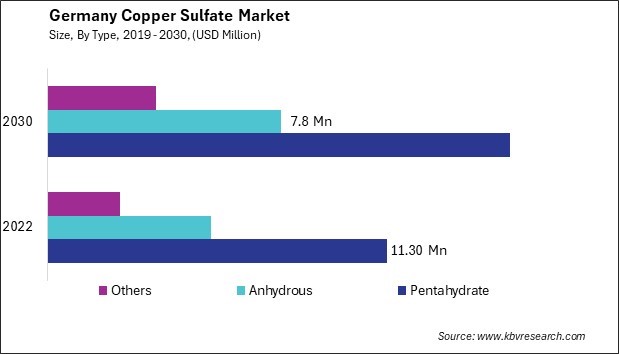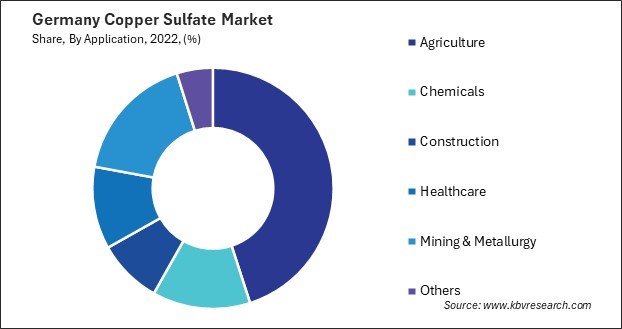Int'l : +1(646) 832-2886 | query@kbvresearch.com
Int'l : +1(646) 832-2886 | query@kbvresearch.com
Published Date : 17-May-2024 |
Pages: 46 |
Formats: PDF |
The Germany Copper Sulfate Market size is expected to reach $26.75 Million by 2030, rising at a market growth of 4.3% CAGR during the forecast period. In the year 2022, the market attained a volume of 87.93 Hundred Tonnes, experiencing a growth of 3.7% (2019-2022).
In recent years, the German copper sulfate market has seen significant developments that have shaped its landscape and demand dynamics. These developments reflect the compound's diverse applications across various industries, including agriculture, chemicals, electronics, and healthcare. Several key trends and advancements have contributed to the evolving nature of the German copper sulfate market, highlighting its importance in both traditional and emerging sectors.

One notable recent development in the German copper sulfate market is the increasing demand for high-purity copper sulfate in industrial applications. This trend is driven by the growing need for advanced materials and chemicals in Germany's industrial sector, which requires copper sulfate for electroplating, metal surface treatment, and copper-based chemicals. The emphasis on high-quality products and efficient manufacturing processes has led to a greater focus on sourcing high-purity copper sulfate to meet industry requirements.
Furthermore, advancements in research and development have led to the discovery of new applications for copper sulfate in areas such as healthcare and biotechnology. The antimicrobial properties of copper sulfate have made it a valuable ingredient in certain pharmaceuticals, medical devices, and antimicrobial products.
According to the International Trade Administration, the German medical device industry is one of the most lucrative healthcare industries worldwide, accounting for roughly USD 42 billion annually, or 25 percent of the European market. Moreover, the Healthcare/Life Sciences (HCT) industry is a priority for both the EU and Germany as reflected in the European Regional Development Fund (ERDF – or EFRE, in German) program and cohesion policy 2021-2027, as well as the German Länder implementation and tendering of this program. Therefore, as Germany continues to invest in healthcare innovation and biotechnological research, the demand for copper sulfate in these sectors is expected to grow.
Germany's reputation for producing premium agricultural goods has led to growing export opportunities, which, in turn, have incentivized farmers to expand their production capacity and adopt modern farming practices. The agricultural sector in Germany has been a key driver of demand for copper sulfate, particularly as a fungicide and pesticide. Recent developments in agricultural practices and regulations have underscored the importance of effective crop protection solutions, further contributing to the demand for copper sulfate in this sector.
With a growing awareness of environmental concerns and the need for eco-friendly agricultural solutions, farmers are turning to copper sulfate as a reliable and effective tool for disease control. Its use aligns with sustainable farming principles by providing a targeted pest and disease management approach. It reduces the need for broader chemical applications that may have a greater environmental impact.
Furthermore, modern agricultural techniques, such as precision farming and integrated pest management, have contributed to the rising demand for copper sulfate in Germany. These advanced practices require effective and precise solutions for crop protection, and copper sulfate's efficacy as a fungicide and pesticide makes it well-suited for these purposes. Its versatility and compatibility with integrated pest management strategies have made copper sulfate a valuable asset for farmers seeking to optimize crop yields while minimizing environmental impact. Thus, the copper sulfate market will expand rapidly in Germany due to all the factors above.
In Germany, there has been an increasing use of copper sulfate in water treatment, driven by its effectiveness in controlling algae and bacteria in various water bodies. This trend is particularly notable in applications such as the treatment of lakes, ponds, reservoirs, and waterways where algae blooms and bacterial contamination can pose environmental and health risks. One of the key reasons for the growing use of copper sulfate in water treatment in Germany is its ability to effectively inhibit algae growth. Algae blooms can harm aquatic ecosystems, leading to oxygen depletion, fish kills, and the production of toxins harmful to humans and animals. Copper sulfate controls these blooms by disrupting the photosynthetic process in algae cells, effectively reducing their population and preventing further growth.
Additionally, copper sulfate is valued for its broad-spectrum antimicrobial properties, making it effective against various bacteria and fungi commonly found in water bodies. This makes it a versatile solution for addressing various water quality issues, including bacterial contamination that can impact water safety and human health. The increasing use of copper sulfate in water treatment in Germany also reflects a broader trend towards sustainable and environmentally friendly solutions. Copper sulfate is considered a relatively eco-friendly option for controlling algae and bacteria compared to alternative chemicals, as it breaks down naturally in the environment over time. Hence, these factors will aid in expanding the market in Germany.

In the German copper sulfate market, several companies play a significant role in producing, supplying, and distributing this essential chemical compound. These companies cater to various industries, including agriculture, chemicals, electronics, and water treatment. Among the notable German copper sulfate market companies are BASF SE, AkzoNobel N.V., Evonik Industries AG, LANXESS AG, Umicore AG & Co. KG, and Otsuka Chemical Co., Ltd.
BASF SE is a leading global chemical company with a strong presence in Germany. The company produces various chemicals, including copper sulfate, used in various industrial applications such as agriculture, water treatment, and chemical manufacturing. BASF's expertise in chemical production and its commitment to innovation contribute to its prominence in the German copper sulfate market.
AkzoNobel N.V. is another multinational company with a significant presence in the German market. The company specializes in paints, coatings, and specialty chemicals, offering copper sulfate products for industrial and agricultural use. AkzoNobel's diverse product portfolio and focus on sustainable solutions make it a key player in the German copper sulfate market. Likewise, Evonik Industries AG is a global specialty chemicals company that provides copper sulfate for applications in agriculture, industrial processes, and water treatment. The company's innovative solutions and commitment to sustainability have positioned it as a reliable supplier in the German market.
LANXESS AG is a specialty chemicals company known for its high-quality products and solutions. The company offers copper sulfate for various industrial applications, including agriculture, water treatment, and industrial manufacturing, serving customers' needs in Germany's chemical industry. Similarly, Umicore AG & Co. KG is a materials technology and recycling group that supplies copper sulfate for industrial applications, including electronics, chemicals, and metallurgy. The company's focus on materials science and sustainability contributes to its presence in the German copper sulfate market.
Otsuka Chemical Co., Ltd., a Japanese company with operations in Germany, provides copper sulfate for industrial and agricultural applications. The company's products are used in diverse sectors, including electronics, pharmaceuticals, and agriculture, reflecting its versatility and broad market presence. These companies and others in the German copper sulfate market contribute to the availability and diversity of copper sulfate products in Germany, serving the needs of industries across the country. Their expertise in chemical manufacturing, quality control, and distribution ensures a steady supply of copper sulfate for various applications in the German market.
By Type
By Application